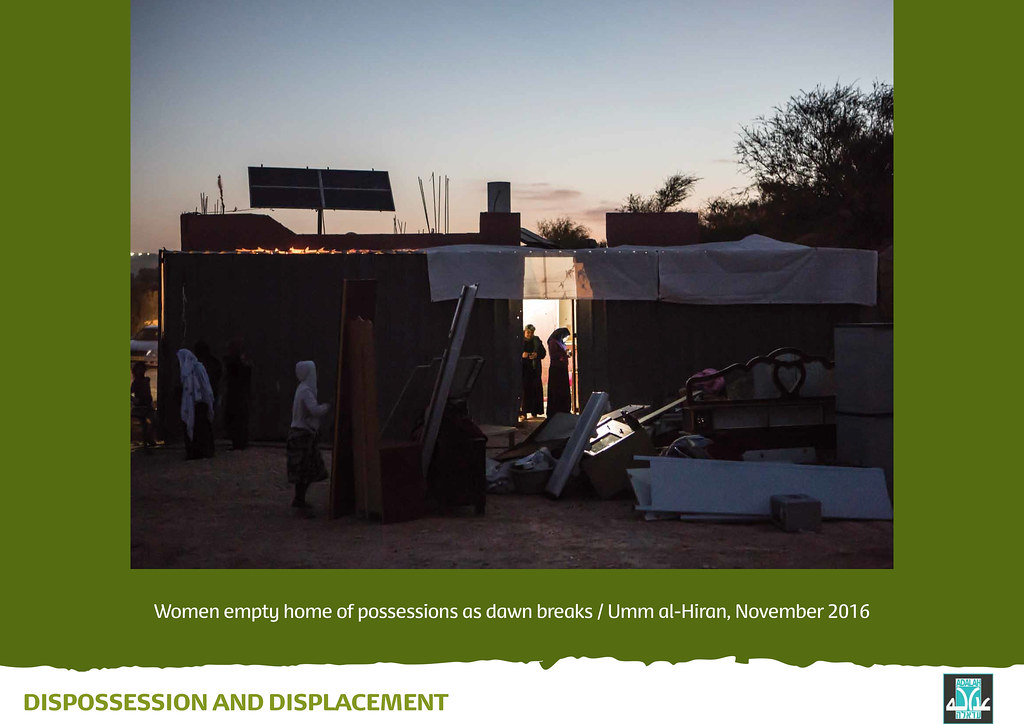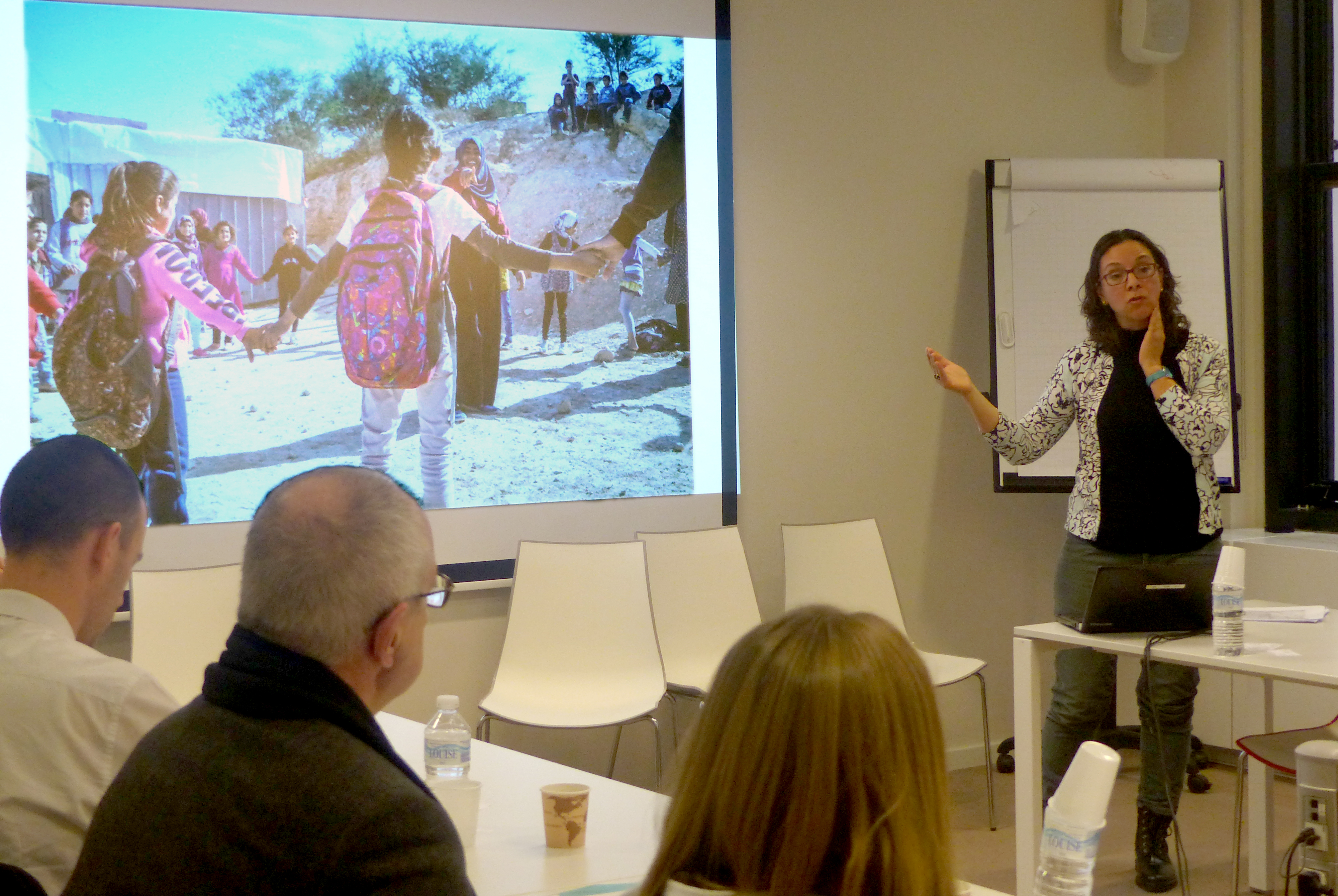Adalah participates in EU advocacy mission on forced displacement on both sides of the Green Line and in 'No Place Like Home' seminar, photo exhibit in Brussels
Adalah – The Legal Center for Arab Minority Rights in Israel joined partner organizations CIDSE, an international alliance of Catholic development agencies, and the Jerusalem Legal Aid Center (JLAC) for an EU advocacy mission and seminar in Brussels on 25-26 January 2017, to raise awareness of forced displacement on both sides of the Green Line and to mark the publication of the report 'No Place Like Home.'
The CIDSE report examines the forced displacement of Palestinians as a central issue in the Israeli-Palestinian conflict, exacerbating the deterioration of social and economic conditions and the isolation of Palestinian communities.
While Israel and the Occupied Palestinian Territory (OPT) are governed, in part, by different bodies of law, parallels can be drawn between the processes of displacement that are occurring in the different geographical and administrative areas.
The two-day seminar was accompanied by a photo exhibition with images provided by Adalah and JLAC.

“Forced displacement and its effects are a central challenge to protecting the rights of Palestinians and promoting the development of their communities in both the OPT and Israel,” Brigitte Herremans, from CIDSE’s working group on Palestine and Israel, said. “Urgent action is needed by the international community, including the EU and its member states, in order to redress the damage done to Palestinian communities. As the primary duty bearer, Israel must uphold its duties under both International Humanitarian Law and International Human Rights law.”
JLAC director Issam Aruri said that “almost 90 percent of the communities in area C face eviction orders. Forced displacement is forbidden under International Humanitarian Law and it has far reaching consequences for Palestinian communities. The Bedouin community, that is already quite vulnerable, is targeted and sees its semi-nomadic lifestyle threatened. It produces 12 percent of red meat and dairy products of the West Bank, so targeting the Bedouins has consequences for the whole area.”
The delegation met with several European officials and diplomats in order to brief them on forced displacement in the OPT and Israel and the profound impact it has on the ability of Palestinians to enjoy their rights under International Human Rights Law, applicable in Israel and the OPT, and International Humanitarian Law, applicable in the OPT.
These discussions were fruitful as they enhanced the EU officials' understanding of the reality on the ground and the parallels that exist between displacement on both sides of the Green Line.
Adalah Attorney Suhad Bishara spoke during the mission and the seminar about the phenomenon of Israel’s displacement of Bedouin communities in the southern Naqab (Negev) desert.
A new governmental plan, "Prawer 2 – 2017," like the former Prawer Plan, which was criticized internationally, outlines a framework process to expedite procedures to demolish unrecognized Naqab Bedouin villages and to dispossess and forcibly displace Bedouin citizens of the state to socio-economically disadvantaged government planned towns.
"The Prawer plan was off the table for some time, but it was reactivated by [Israeli Minister of Agriculture] Uri Ariel," Attorney Bishara explained.

Adalah Attorney Suhad Bishara speaking about the phenomenon of Israeli state displacement of Bedouin communities. (Photo by CIDSE)
“Israel uses the law to wage a war by different means against its Palestinian citizens. Several laws illustrate this. The state wants to delegate authorities within Israel to the World Zionist Organization. From a constitutional perspective, this is very problematic as the Ministry of Interior should be in charge of land planning. Furthermore the Jewish National Fund – which openly declares that its mission is to serve only the Jewish people - constitutes 43 percent of the Israel Land Authority, the governmental body that is responsible for planning."
"There are other laws that apply differently to Arab and Jewish citizens of the state such as the Law of Return (allowing Jews from anywhere in the world to obtain citizenship in Israel), the Citizenship Law (banning Palestinian family reunification in Israel) and the Admissions’ Committee Law. This last law functions as a main system of segregation, and gave rise to a system that facilitates the selection of inhabitants in small Jewish communities. The criteria are based on 'social suitability' and it mainly excludes Arab families. If you are in favor of full citizenship for all citizens then you are denying the Jewish character of the state, many argue."
The forcible transfer of Bedouin communities has been identified as a “red-line” trigger for further European Union (EU) action. EU statements and diplomatic interventions call for restraint. Yet, the prevalent approach taken by the EU towards the displacement of Palestinians fails to protect their rights, as there are no concrete consequences for the persistence of unlawful practices on the ground and no consensus on the measures necessary to ensure Israel’s respect for international law.
PHOTOS: Adalah exhibition imagery from Umm al-Hiran















